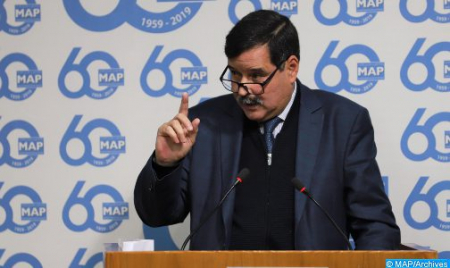Hostility Towards Morocco, Sole Leitmotiv of Algerian Regime’s Fallacious Anti-Morocco Maneuvers – Journalist
The fallacious anti-Morocco maneuvers hatched by the Algerian regime show that hostility towards Morocco is set as a state doctrine in Algiers, said writer-journalist Talaâ Saoud Al Atlassi. The slanderous campaign and attacks carried out by Algeria’s diplomatic channels and media against Morocco are proof that hostility and resentment are set as a state doctrine in Algiers, Al Atlassi pointed out in an article published on “Machahid 24” news website. He added that this tenacious grudge against Morocco is useless and can never harm the Kingdom. “On the other hand, its harm to the Algerian people is certain as it prevents them from taking advantage of a strong, natural and historical support that is Morocco. This support has been the case in the past and Morocco is even more willing to provide it in the future.” For Saoud Al Atlassi, “the Algerian regime that holds all the powers in Algeria has in its possession media outlets of which it is the first victim,” indicating that “this failed regime whose main weakness is the loss of people’s confidence, can not even guarantee Algerian citizens access to the most basic food products.” “Algeria wastes millions of dollars inside and outside the country to finance pointless media scams against Morocco; a Kingdom that is well-anchored in its position and useful, through its geography, for itself and for others,” he further continued. “The credibility of the press can not be bought but rather asserted through the truth.” Talaâ Saoud Al Atlassi noted, in this regard, that the vast majority of Algerian news agency’s reports on Morocco are fake news. “Millions of dollars wasted, money thrown out the window, for the sake of fake news and media propaganda with no credibility in Algeria or abroad,” he said. Commenting on the statements of the Algerian Army’s incessantly talkative Chief-of-Staff, he stressed that by acting as the real president, “he lifts the veil on the military identity of the Algerian regime since General De Gaule gave up power in 1962 to the National Liberation Front.” “This General does not lose an opportunity to drain the power held by civilians, who are forced to play the role of extras in a boring, poorly staged theater play,” and to declare himself astonished by the fact that “in all countries, the chiefs of staff only express themselves within the framework of their military prerogatives, except in military regimes where one witnesses a takeover of the institutions of the State while preserving the appearances of a civil and democratic State. This is the case of the Algerian regime, whose staff is distinguished by its incessant chatter.” Meanwhile, Moroccan diplomacy multiplies the successes that annoy the Algerian regime, he said, specifying that Morocco’s successes are the result of a conviction that world powers have reached: Morocco has all the necessary potential for its development and its influence on the regional level. He underlined, moreover, that “the countries that respect themselves do not take decisions in light of the Algerian press agency’s news reports, nor even less in the light of Algerian newspapers’ articles or the speeches of the Algerian Chief-of-Staff and his clerk, the Minister of Foreign Affairs.” “The decisions of countries that maintain strong relations with Morocco in the diplomatic, economic and security fields, are the result of an appreciation of the potential of Morocco, which is capitalized in the framework of a strategic vision driven by HM King Mohammed VI, in the social, economic and diplomatic fields and which takes into account the national, Maghreb, Arab, Mediterranean and African dimensions,” he argued. These are “truths accepted by European countries that after useless destabilizing maneuvers, being annoyed by the progress made by the Kingdom, have finally realized that they have more to gain with Morocco; a growing, on-the-move country.” “The same truths, moreover, motivated the decision of the Gulf Cooperation Council countries to consolidate their relations with the Kingdom and effectively supporting its territorial integrity, in a fraternal impulse based on history and turned towards the future.” These are also the truths that have favored the development of strategic and deep relations between Morocco and the United States of America, which guarantee the Kingdom to maintain a friendship based on partnership and fruitful exchanges with the majority of African, European, Asian and Latin American countries, in addition to Canada. All these truths “have defeated the Algerian diplomatic maneuvers and media scams against Morocco. They did so yesterday as it will be the case today and tomorrow,” he concluded.

